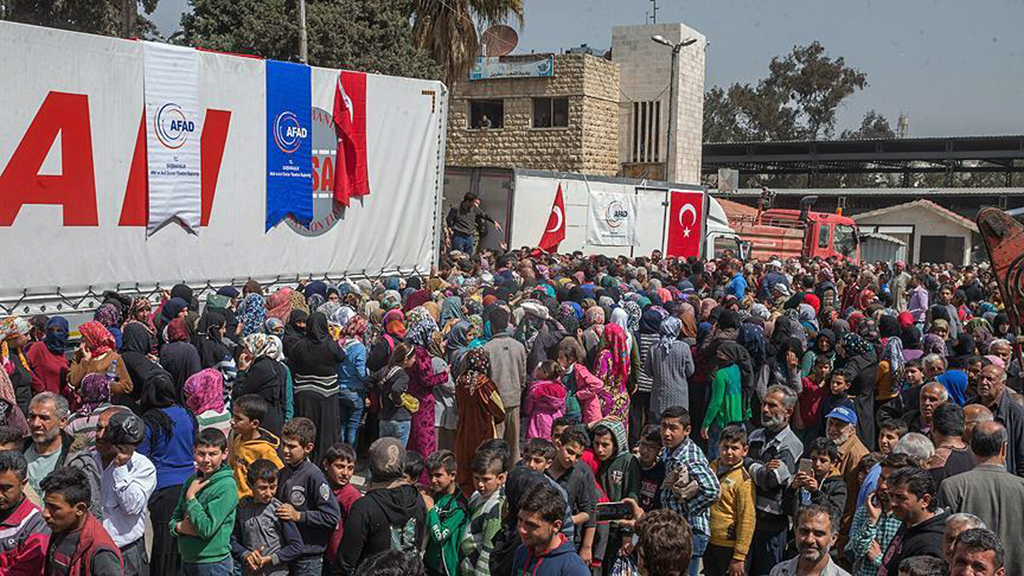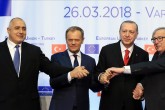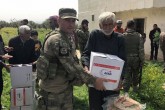The Afrin operation changed the situation in northern Syria significantly. I mentioned in an earlier column how the Turkey’s use of hard power and a unilateral military operation transformed the situation in Syria and the perception of Ankara’s determination to clear its borders of terrorist groups. After the beginning of the Afrin operation, there were different debates about its nature and potential outcomes. Some analysts expected that there would be no operation because Turkey would be incapable of conducting one. Others argued that if there would be an operation, it would be long and challenging and Turkey would get bogged down. There were certain misconceptions, misperceptions and misunderstandings about Turkey and its military operation.
First of all, many had underestimated the threat perception that the PKK-affiliated People’s Protection Units (YPG) have generated for Turkey. Until recently, both the U.S. State Department and the Pentagon used to end statements about Turkey by saying that the fight against Daesh should be the focus of both the U.S. and Turkey and nothing should distract from it. However, for Turkey, the PKK was also an imminent and urgent threat. The PKK conducted more terrorist attacks in Turkey, and for Ankara, the PKK was not a threat that could be neglected. In the last two years, the PKK committed some of the deadliest terrorist attacks in city centers of Turkey, including Istanbul and Ankara. Ankara did not have the time or patience to delay the military operations against the YPG. So when Turkey was signaling that it would not let its borders be controlled by terrorist forces, it was very serious, and those who failed to understand this seriousness could not foresee the Afrin operation. They considered it a surprise, which was their misunderstanding of Ankara’s security concerns.
Once the operation started, another debate began about its possible outcomes. Some instated that either Turkey would fail to win and would get bogged down in Afrin or eventually win the battle but it would be a very costly, pyrrhic victory. Analysts provided different explanations to defend their views.For some, in the current circumstances the Turkish military did not have the capability to conduct such a large-scale military operation, especially after the cleansing of the military ranks following the July 15, 2016 coup attempt. Although the Turkish military conducted Operation Euphrates Shield after the coup attempt, for some, the Afrin operation would be more challenging and the military was not ready to handle it. This was proven wrong with the success in Afrin, as the military demonstrated its combat readiness and operational success.
Very much related to this earlier argument, some others largely overestimated the operational capability of the YPG. They expected that Turkey would get bogged down because compared to Daesh, the YPG was better trained, equipped and disciplined. So compared to the Jarablus and even al-Bab operation, this one would face more serious confrontation and resistance. However, these analysts forgot that the YPG gained most of its success on the ground due to the unwavering international coalition support from the air. The YPG was not that powerful without air support and were defeated in the first confrontation they faced without international support.Others expected the operation to fail due to potential uprisings in Turkey among the Kurdish population in reaction to the operation in Afrin. Again, this operation did not generate serious opposition among Turkey’s Kurdish population. On the one hand, Kurds in Turkey have been victims of PKK terrorism and its attempt to extract resources from them. Unlike those who uses the words Kurds and PKK interchangeably, there has been a serious reaction from Kurds against the PKK. Many thought that the civilian causalities would launch a movement in Turkey. However, the military acted very carefully in the operation and tried to prevent civilian deaths during the operation so the YPG could not use it for propaganda.Of course, there were others whose anti-Turkey positions blinded them to the potential outcomes of the operation. Because of their opposition, they did not want Turkey to be successful. With very wishful thinking, they expected Turkey to fail or get bogged down in Afrin. Their projections for the operations were mostly their hopes. They tried to bring together all of the concerned talking points about the operation from different agencies and groups that oppose to the operation. Turkey’s military success on the ground in Syria changed the dynamics dramatically. From now on, when Ankara expresses concern about its national security, these analysts need to understand that with the support of its public, the government is ready to handle any form of threat to its national security through the use of the instruments at its disposal.
[Daily Sabah, 31 March 2018]
In this article
- Opinion
- 2016
- 2018
- Anti-Turkish Sentiment | Anti-Turkism | Turkophobia | Turkish Fear
- DAESH
- Daily Sabah
- East of the Euphrates
- Fight against DAESH
- Fight Against Terror
- Kurdish Population
- Kurdistan Workers' Party Terrorist Organization (PKK)
- Middle East
- Operation Euphrates Shield
- Opposition
- People's Protection Units (YPG)
- PKK - YPG - SDF - PYD - YPJ - SDG - HBDH - HPG - KCK - PJAK - TAK - YBŞ
- Syria
- Syrian Civil War
- Syrian Conflict
- Syrian Crisis
- Terror
- Terrorism
- United States (US)



